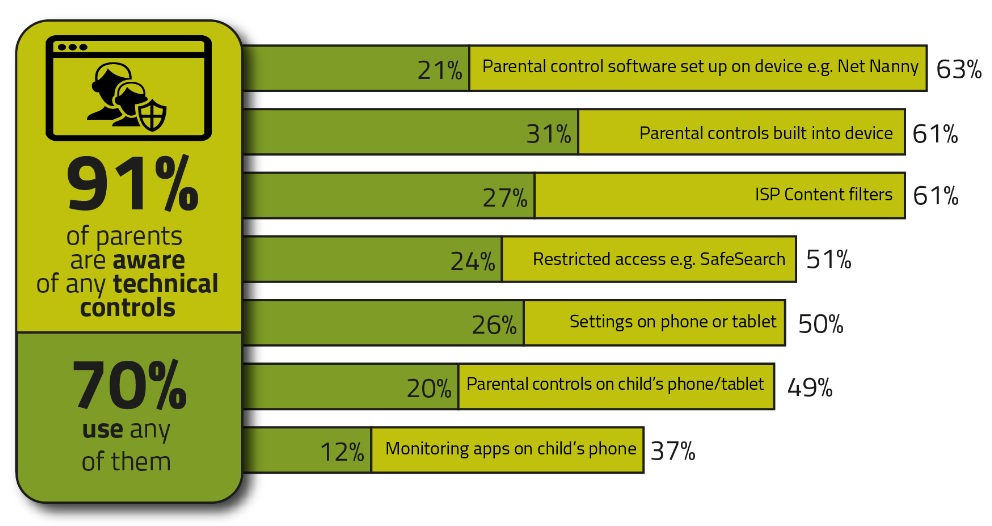A Quarter of UK Parents Use Content Filters from Broadband ISPs

A new Ofcom report has found that 61% of parents are aware of the existing network-level internet filtering (Parental Control) tools provided by big UK broadband ISPs, yet only 27% have actually chosen to use them. Meanwhile, 6% of children have circumvented parental controls and 5% used a proxy server to avoid them.
The results from Ofcom’s latest ‘Children and parents: media use and attitudes report 2022‘ have particular relevance this year because of the Government’s new Online Safety Bill (OSB), which seems to be laser focused on making the UK the safest country in the world for children to go online. But this in turn requires significantly more aggressive censorship of legal online content, which will impact everybody and not just children.
As a result it’s easy to forget that all of the market’s largest mobile and broadband ISPs (e.g. BT, Virgin Media, Sky Broadband, TalkTalk and more) have, as part of an earlier agreement with the Government, already adopted a system of network-level filtering that blocks potentially harmful websites across all connected devices from the gaze of young eyes. Customers can disable this if they so choose (it’s enabled by default).
Advertisement
Overall, some 91% of parents with UK children aged 3-17 were aware of the many different types of technical tools and controls mentioned in Ofcom’s survey (i.e. everything from ISP filters to software, Google SafeSearch, app controls etc.), and 70% had used any of them. As above, these results reduce to 61% when talking specifically about familiarity with network-level filters from broadband ISPs, with adoption of just 27%.

In addition, some 56% of parents of UK children aged 3-17 who had their own mobile phone were aware of a block on adult or 18+ content that can be put on their child’s mobile, but only 35% had the block in place on their child’s phone.
Among those who were aware of, but did not use, network level filters from their broadband ISP, the most common reasons were that they trusted their child to be sensible or responsible when online (45%) or that they preferred to supervise their child’s online use by talking to them and setting rules (44%).
Advertisement
However, up to a fifth of parents questioned their usefulness: 18% said that ISP filters block too much or get in the way, while 11% said they don’t block enough. And while 17% said they were too complicated to use (this makes no sense as they’re enabled by default), a further 7% said that their child could find a way to get around the filters.
The survey also included some feedback from the children themselves. When asked which measures they used to protect themselves online, some 35% of children aged 12-17 reported using measures which might in fact have put them more at risk, because they could enable them to come across potentially harmful content. This included those who had surfed in incognito mode (21%), had deleted their browsing history (19%), and those who had circumvented parental controls put in place to stop them visiting certain apps and sites (6%), or used a proxy server to access particular apps and sites (5%).
Interestingly, there were some big differences by nation on the views of the content filters provided by home broadband ISPs. Parents of children in Wales were less likely than those in Northern Ireland to trust their child to be sensible or responsible instead of using these (47% vs 33%). And parents of children in England were more likely than those in Northern Ireland to prefer to supervise their child’s online use by talking to them and by setting rules (40% vs 29%).
We should add that any future rules (i.e. Online Safety Bill) to block websites at ISP level will almost certainly suffer from some big flaws, since ISPs have no ability to remove the content posted on remote web servers and thus the blocks they’re able to enforce are akin to placing a “do not enter” sign on an open bedroom door. This is not the fault of ISPs, it’s just a facet of how the internet itself works.
Advertisement
Mark is a professional technology writer, IT consultant and computer engineer from Dorset (England), he also founded ISPreview in 1999 and enjoys analysing the latest telecoms and broadband developments. Find me on X (Twitter), Mastodon, Facebook, BlueSky, Threads.net and Linkedin.
« Cuckoo Boss Calls on UK ISPs to Scrap Exit Fees and Price Hikes






















































I use adguard dns, I use the DoH version.
Works a treat, plus there are profiles that can be added to idevices so it works everywhere including cellular data.
Far easier than running a pihole.
Adguard are a Russian outfit, I’d tread carefully.
I would never use any DNS services from anyone just setup your own and run it over pfsense plus you get to decide what gets through the network and Ad blocking from the network side is a game changer
I think the majority of kids are more tech savvy than their parents and easily circumvent any measures put in place… I also think letting kids use their devices in their bedrooms is a pathway to problems. Stuff done in the family area is most likely to be wholesome. Putting too many restrictions in place is seen as a challenge by many kids. It is a difficult time to be a parent.
Only reason for using content filters is to prevent accidental exposure when they are young, once they actively look for such content, you may as well remove them.
You’re stunting their ability to gain knowledge, you could at the very least give them access to Wikipedia/Britannica.
Me personally I don’t need to look at appropriate content as we are all adults in our household. But that being said if I had kids I would do the same because those websites are infected with all sorts of malware and viruses.
I would agree with what Mike says you should give them more internet access filter out all bad stuff but keep educational and cartoons websites going. You get YouTube for kids. Try not limit them too much.
A child unsupervised is highly likely to get sucked in by the predatory practices businesses use online, heck, adults do.
Supervised access, encouraging them to look at things educational, sure. But its better they have no access than unsupervised. Far too many Roblox addicts out there already, or kids posting on social media trying to get attention.
The Internet will NEVER be child safe nor should it be. Its like expecting the real world to be entirely child safe, its completely unrealistic and impractical. If only more parents realised this.
I’ve never used any of the software options (NetNanny and the like). I set the DNS IP Address to manual in the router and the primary/secondary DNS addresses to OpenDNS’s (I used to use Norton ConnectSafe until it was withdrawn). I have an OpenDNS account (though not really needed for basic filtering/protection function) that allows more filtering options. And I could if I wished add specific URLs or keywords using the router’s URL blocking facility. Currently debating whether to add “twitch” to that!
I know kids can get around things but if you use a DNS like 1.1.1.3 with malware and adult filter. If you change the DNS on your Router that would even better.
In my personal opinion kids shouldn’t be allowed the internet until there 18 to give kids a chance to be kids. In 1990s I was outside with my mates. Kids have it too easy in the 90s I came home for my tea and went back out and we didn’t come home until the street lights came on. Social Media is ruined them because instead of going out to play they sit in there house playing candy crush and Facebook Instagram and Snapchat and worrying about body image.
l disagree, the internet can be a great learning tool… the biggest problem is parents who treat the internet as daycare and expect someone else to protect them.. after all its a parents job to keep an eye on their internet usage not someone elses and while ISP level filtering is pants its whats been mandated by those who have little to no clue of how the internet works, not to mention there are a wealth of tools out there to do such things locally, but yet again nothing will help unless parents actually do their job.
These numbers are a bit confusing when it comes to ISP control filters. Since they are on by default, doesn’t it follow that anyone who isn’t aware of them (and possibly a chunk of people who are aware of them existing, but don’t realise they are using them), is actually using them?